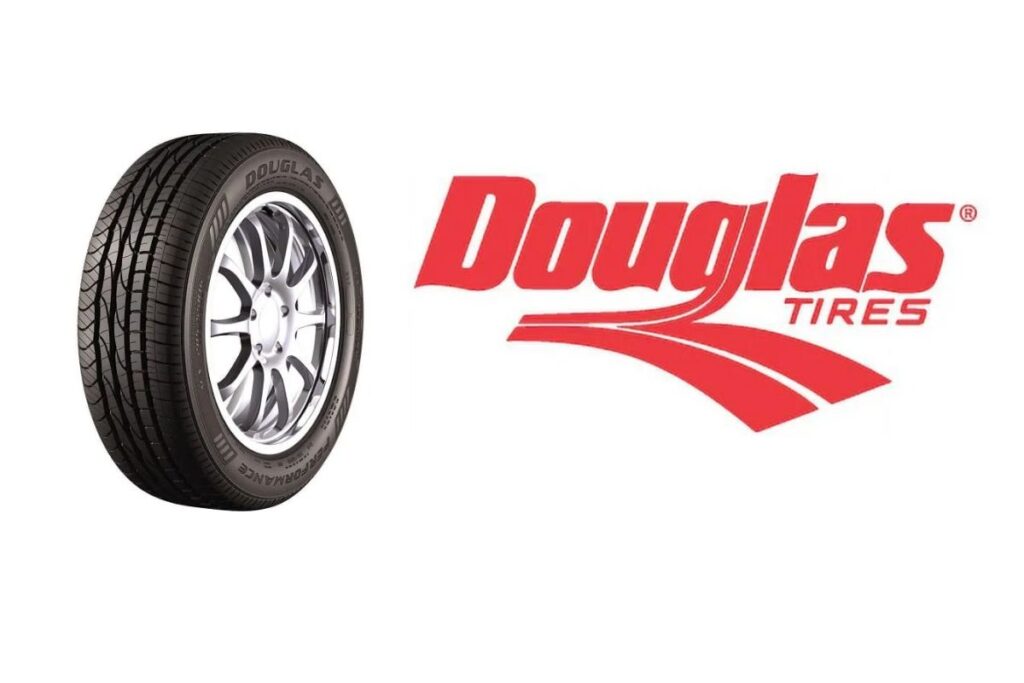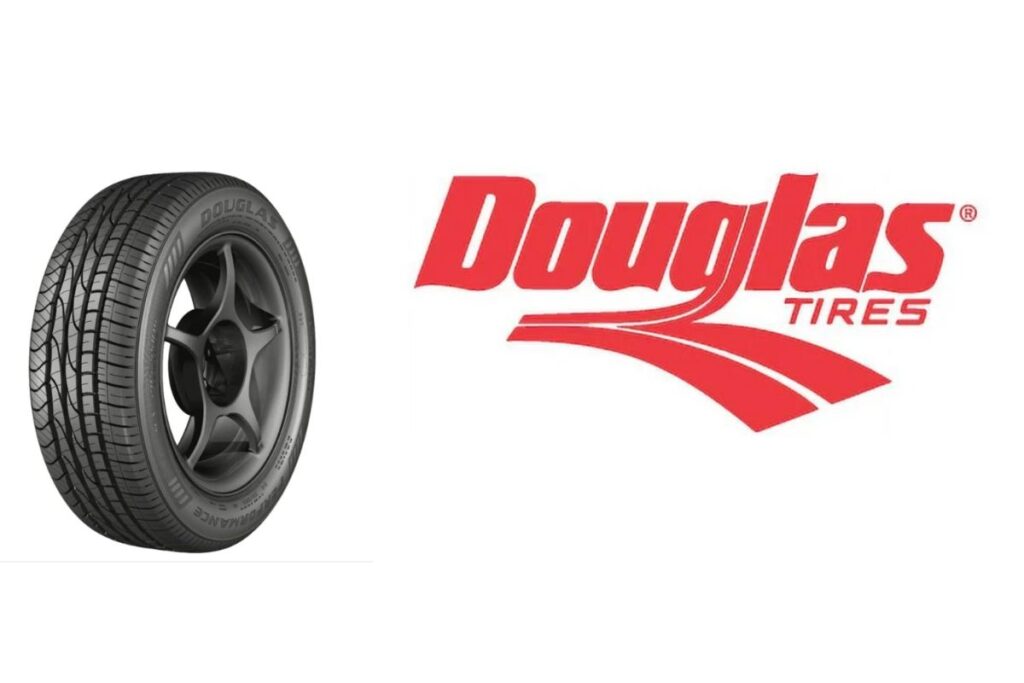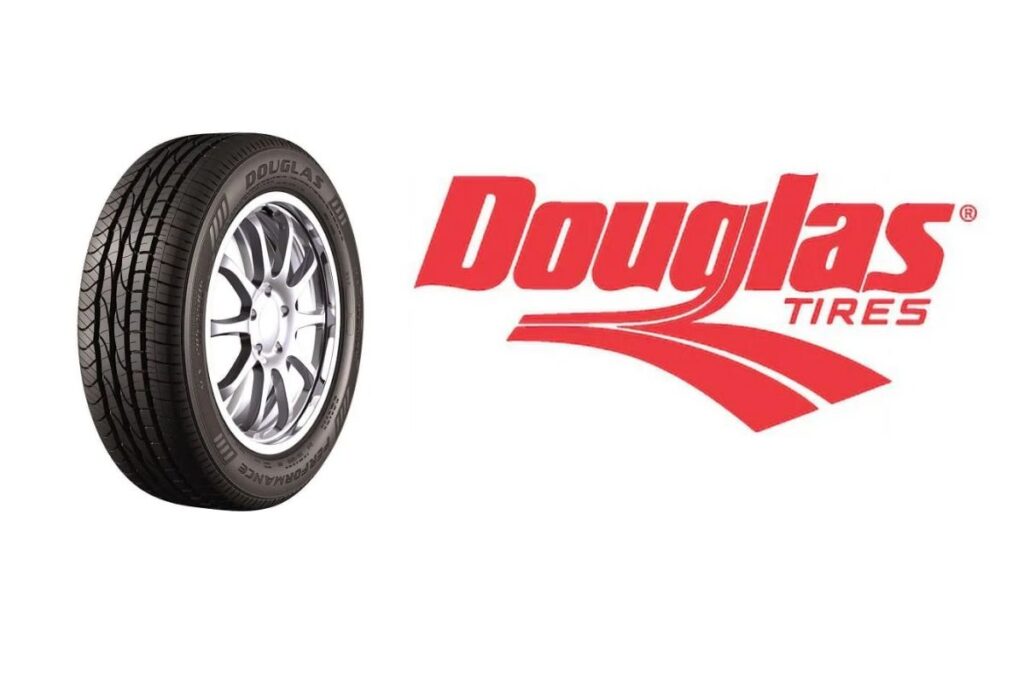When I started looking into Douglas tires, I was unsure because there wasn’t much information about them, and people had different opinions about how well they performed and how long they lasted.
I did a lot of research on Douglas tires to get a good understanding of them. But I didn’t find much helpful information, so I still had a lot of questions. So, I suggest being cautious when reading this review because the main thing that makes Douglas tires attractive is their low price.
Douglas tires are a cheaper option compared to other brands. While high-end tire sets usually cost between $300 and $500, Douglas tires are more affordable. You can get a full set of four tires for about $200, giving you good performance without spending a lot of money.
Douglas Tires Overview
Walmart sells tires from well-known brands like Goodyear, which includes sub-brands like Douglas.
Douglas is an American tire brand. It is owned by Goodyear’s Kelly Springfield Tire Company. You can only buy Douglas tires at Walmart.
Choosing tires from a reliable brand at a popular store may seem wise. Many customers are happy with Walmart’s tires. However, cheap and premium tires can have different performance during sudden stops.
While both cheap and premium tires are suitable for normal driving, premium tires offer better safety and comfort. In emergencies, such as quick stops or swerving, premium tires usually outperform cheaper ones. This difference can be crucial in preventing accidents, especially in adverse weather conditions.
To decide if Douglas tires are right for you, compare them with other options. Think about how safe, durable, and well they perform in everyday driving and emergencies.
Why Choose Douglas Tires?
You can easily find Douglas tires at Walmart stores or online. They are affordable, like Laufenn and Ironman tires. Douglas tires are good quality and come with a 45,000-mile warranty. Remember, to make a warranty claim, you must have the tires mounted at Walmart stores.
Douglas Tires Review
1. Douglas All-Season

Douglas makes an “All-Season” tire for various types of cars, from small to mid-size sedans, minivans, and crossovers. It’s affordable, even cheaper than other budget brands like Riken, General Tire, Kumho, and Uniroyal.
The tire performs decently on dry roads, giving good traction and cornering grip like most modern tires. But in the rain, it lacks advanced tread compounds, affecting its performance. There’s not much information about the rubber used, which raises questions about its quality.
The Douglas All-Season struggles in winter conditions, performing poorly on snow and ice. This makes it unsafe for harsh winter weather, despite being called an all-season tire.
It’s somewhat noisy but tolerable and provides an okay ride quality for its price. But its tread life is short, lasting only about three years. Competitors offer double the lifespan. For instance, the Douglas tire is priced at $51 for a size of 215/60R15. It comes with a 45,000-mile warranty. The Cooper CS5 Grand Touring tire costs $100 for the same size. It has an 80,000-mile warranty and provides better traction on all surfaces for safer driving. In the end, the costs of both tires are similar, making the Douglas tire less attractive in terms of value.
| Pros | Cons |
|---|---|
| Provides good traction and grip in dry conditions. | Loses traction and grip in the rain. |
| Quiet and comfortable. | Below average traction on light snow and ice. |
| Stable at higher speeds. | Treadlife is shorter than average. |
| Very affordable. |
2. Douglas Performance

The Douglas Performance tire is for drivers who seek a good driving experience at a reasonable price. It combines comfort and control. While it may not steer as sharply as more expensive tires, it still offers good handling and responsiveness, which is impressive given its low price.
On dry roads, the Douglas Performance tire has good grip and handling for its cost. But it doesn’t perform as well as more expensive options, especially on high-performance vehicles.
In wet conditions, the tire loses traction and grip, leading to longer braking distances and less stability when cornering. Even though it has an all-season tread, it doesn’t perform well on snow and ice, showing its limitations in bad weather.
The manufacturer doesn’t say if the tire is for all seasons or just summer, which may confuse buyers about when to use it. The tire does come with a 45,000-mile warranty, but it might not last as long as other budget or expensive tires.
Overall, the Douglas Performance tire is a compromise between comfort and performance. It might not satisfy drivers looking for top handling and traction, especially in bad weather. Buyers should think about their driving needs before choosing this affordable tire.
| Pros | Cons |
|---|---|
| Handles well on dry roads. | Poor traction on wet roads. |
| Provides good grip when cornering in dry conditions. | Not suitable for use on snow or ice. |
| Comfortable and quiet. | Tread life is below average for this type of tire. |
| Very affordable to purchase. |
Douglas Tires Review: Buying Guide
Douglas offers two tire models: the All-Season and Performance. The names are simple and lack detail. Information is limited to a brief description of the tread pattern. Douglas specializes in making affordable tires. Let’s now review the pros and cons of these models.
Positive Aspects of Douglas Tires
Affordability
Douglas tires are renowned for their exceptionally low prices. They rank among the most economical options available, often undercutting even their Chinese counterparts.
Dry Road Performance
Despite their budget-friendly nature, Douglas tires deliver commendable performance on dry surfaces. While they don’t have the latest technology, they offer enough traction and grip for regular driving.
Comfortable Ride
Douglas tires are not the smoothest or quietest but offer decent comfort for their price. They have a soft ride and low tread noise, making driving fine even on highways.
Negative Aspects of Douglas Tires
Wet Traction
Drivers who need good performance in wet conditions should consider other tire brands instead of Douglas. Douglas tires resist hydroplaning but do not provide enough traction and grip on wet surfaces.
Snow and Ice Performance
Light snow is a problem for Douglas tires because their tread doesn’t work well in cold weather. These tires have poor traction in snow and perform poorly on icy roads.
Durability Concerns
Despite their initial affordability, Douglas tires fall short in terms of longevity. Their cheaper price tag may translate to a shorter lifespan, ultimately resulting in higher long-term costs for drivers.
Are They Any Good?
We believe Douglas tires are the best choice for those who can’t spend more than $60 per tire. This could be people in low-income areas or those with a budget car in need of new tires. We suggest these budget tires for those who need them.
In reality, tires in this price range will not match up to higher-end brands, which we suggest for those who can afford them.
We advise upgrading to a better brand, such as Bridgestone or Michelin, when you are able to.
Conclusion
Douglas tires may suit short city commutes but might not be reliable for long-term use. It’s better to choose a brand with a strong reputation for highway driving or long trips. Walmart doesn’t provide enough manufacturing details for Douglas tires, so it’s wise to be cautious.

